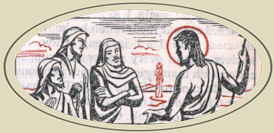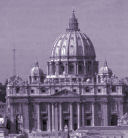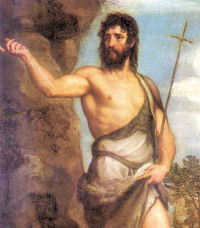Make your gift today!
Help keep Catholics around the world educated and informed.
Already donated? Log in to stop seeing these donation pop-ups.
Advent: December 11th
Third Sunday of Advent
Other Titles: Day 1 O Antiphons: O Sapientia (O Wisdom)
» Enjoy our Liturgical Seasons series of e-books!
"Rejoice: the Lord is nigh." As Christmas draws near, the Church emphasizes the joy which should be in our hearts over all that the birth of our Savior means for us. The great joy of Christians is to see the day drawing nigh when the Lord will come again in His glory to lead them into His kingdom. The oft-repeated Veni ("Come") of Advent is an echo not only of the prophets but also of the conclusion of the Apocalypse of St. John: "Come, Lord Jesus," the last words of the New Testament.
Today is known as Gaudete Sunday. The term Gaudete refers to the first word of the Entrance Antiphon, "Rejoice". Rose vestments are worn to emphasize our joy that Christmas is near, and we also light the rose candle on our Advent wreath.
The feast of St. Damasus, which is ordinarily celebrated today, is superseded by the Sunday liturgy.
Click here for commentary on the readings in the Extraordinary Form of the Roman Rite.
Christ Even Now on the Way to Bethlehem
Evidently, in the mind of holy Church, neither the prophecy concerning Bethlehem Ephrata nor its fulfillment in the day of Caesar Augustus is to be considered merely a glorious divine disposition and achievement. No, the prophecy of Micheus is still being verified every day, but predominantly during the annual Advent season; for the selfsame incarnate eternal Son of God who journeyed to Bethlehem to be born there physically, now to the end of time comes to human souls as to spiritual Bethlehems, there to be born anew, again and again.
But be sure to picture these merciful spiritual journeyings of Christ to the Bethlehem of souls as all too often sadly realistic spiritual repetitions of His first long journey over the rugged road from Nazareth to Bethlehem. Meditate long on the wanton and malicious opposition He encounters on His way to them from souls that leave their senses and heart and mind to be ruled by earthly vanities, and their whole selves to be willing victims of the sensual and selfish illusions and witcheries of the seven capital vices.
Can you still fail to see why Isaias and the Baptist compare the hardships of the way of the world's Messiah-King to souls with a rough, crooked, and almost impassable road up steep hills and down precipitous valleys and through dangerous mountain passes? Do you wonder that these prophets of His coming insist so strongly that merely sentimental longings and routine prayers, however multiplied, cannot prepare us worthily for the entrance He must expect and the welcome He craves?
Pray very honestly, therefore, that you may begin to see the practical reasons for the Church's crying out in the desert world, and even into your own interior soul and heart:
"Prepare ye the way of the Lord: Make straight in the wilderness His paths; Every valley shall be exalted; Every mountain and hill shall be made low; And the crooked shall be made straight; And the rough ways plain" (Is. 40:3, 4). Then shall you see the salvation of God!
Excerpted from Our Way to the Father by Rev. Leo M. Krenz, S.J.
 Commentary for the Readings in the Extraordinary Form:
Commentary for the Readings in the Extraordinary Form:
Third Sunday of Advent
"I (John) am the voice of one crying in the desert,. . .but (pointing to Christ) in the midst of you there has stood One Whom you do not know" (Gospel).
This is known as "Rejoice" Sunday, from the opening word of the Introit. Despite our self-praised progress, real joy is missing from modern life. In such a "desert" we must look to Christ. Only He can "bring light to the darkness of our minds" (Prayer). Only He can bless, deliver and forgive (Offertory). Only He can "say to the faint-hearted, 'Take courage'" (Communion Verse).
During these days before Christmas "have no anxiety" about selecting or receiving mere tinsel gifts, but prepare "in. . .prayer. . .with thanksgiving" and "guard. . .your minds in Christ," the true source of our joy (Epistle).
Excerpted from My Sunday Missal, Confraternity of the Precious Blood
Advent Reflection: Stepping Out of the Night
What is Advent? Many answers can be given. We can grumble and say that it is nothing but a pretext for hectic activity and commercialism, prettified with sentimental clichés in which people stopped believing ages ago. In many cases this may be true, but it is not the whole picture.
We can also say that Advent is a time when a kindness that is otherwise almost entirely forgotten is mobilized; namely, the willingness to think of others and give them a token of kindness. Finally we can say that Advent is a time when old customs live again, for instance, in the singing of carols which takes place all over the country. In the melodies and the words of these carols, something of the simplicity, imagination and glad strength of the faith of our forefathers makes itself heard in our age, bringing consolation and encouraging us perhaps to have another go at that faith which could make people so glad in such hard times.
This latter kind of experience of Advent brings us quite close to what the Christian tradition has in mind with this season. It has expressed its view of Advent in the Bible texts which it took as the season's signposts. I will mention just one of them, a few verses from Paul's letter to the Christians in Rome. There he says, "... it is full time now for you to wake from sleep...the night is far gone, the day is at hand. Let us then cast off the works of darkness and put on the armor of light, let us conduct ourselves becomingly as in the day, not in revelling and drunkenness, not in debauchery and licentiousness, not in quarrelling and jealousy. But put on the Lord Jesus Christ..." (Rom 13:11-14).
There are many people, of course, who urge us to get up and awake; "Germany, awake!" was the cry of those who, years ago, were bent on deluding the nation; and today too there are awakenings and uprisings that lead further into darkness instead of out of it. What does Paul mean? He puts very clearly what he means by "night" by speaking of "revelling and drunkenness, debauchery, licentiousness, quarrelling and jealousy."
For Paul, nocturnal revelling with all that goes with it stands for the dark side of human nature, man's being "asleep". For him it becomes a symbol of the pagan world as such, submerged in material things, held fast in the darkness that prevails where there is no truth and which, despite all its decibels and hectic activity, is asleep, because it lives unaware of genuine reality, of the real human vocation.
Nocturnal orgies as the image of a world in ruin—are we not appalled to see how aptly Paul characterizes our present times, which are returning to paganism? For us, "rising from sleep" means arising from conformity with the world and with the times and having the courage to believe and to shake off the dream that causes us to bypass our true vocation and our best possibilities. Perhaps the Advent hymns we hear every year may be lights to us, indicating our path, making us look up and recognize that there are greater promises than those of money, power and pleasure. Being awake for God and for other people—that is the kind of "waking" that Advent has in mind, the wakefulness which discovers the light and brightens the world.
—Joseph Cardinal Ratzinger, Seek That Which is Above

Third Sunday of Advent, Guadete Sunday
Station with San Pietro in Vaticano (St. Peter's in the Vatican):
The Station is at St. Peter's in the Vatican. After the two great basilicas chosen for the first and for the second Sunday in Advent, we come to St. Peter's in the Vatican, a church which shares with the Lateran the chief feasts of the year. It was selected as the station for today, because on this Sunday occurred the final scrutiny or examination of those candidates preparing for the Ordinations usually held on Ember Saturday in December. The original basilica was built by Constantine in 323 over the place where St. Peter was buried.
For more on San Pietro in Vaticano, see:
For further information on the Station Churches, see The Stational Church.






